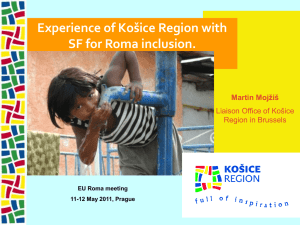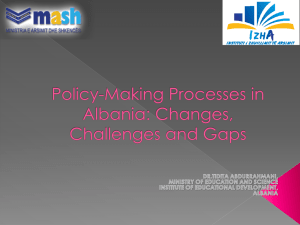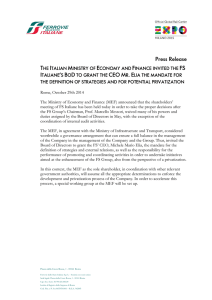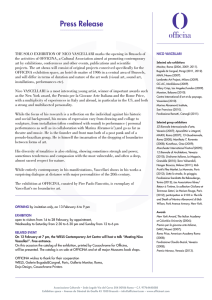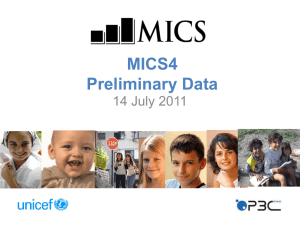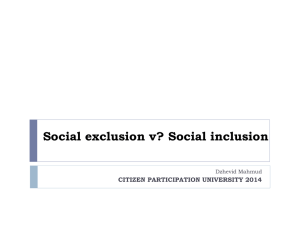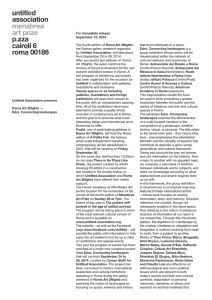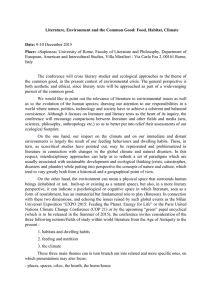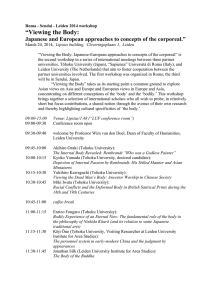Support to the social inclusion of the most vulnerable groups
advertisement
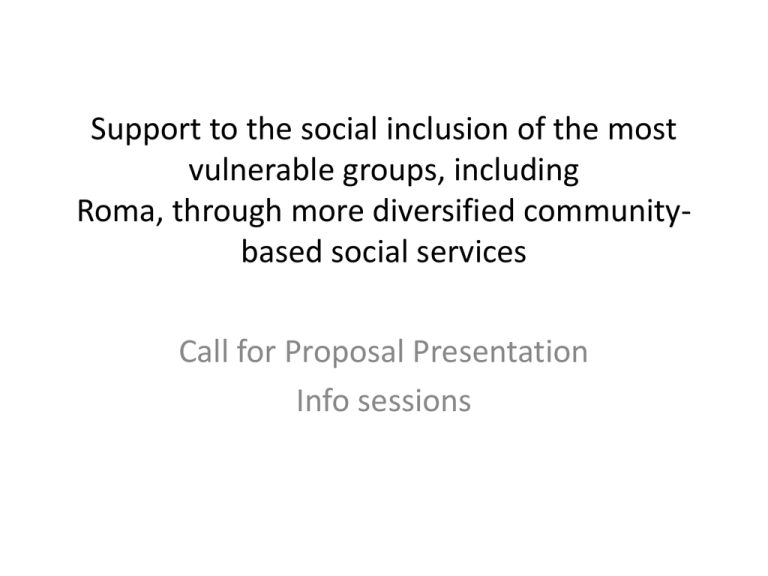
Support to the social inclusion of the most vulnerable groups, including Roma, through more diversified communitybased social services Call for Proposal Presentation Info sessions Disclaimer: • This presentation represents summary of published Guidelines for the EuropeAid/135483/DD/ACT/RS Call for Proposals. • In the case of any discrepancy between the Serbian and English version, the English version shall prevail. • The presentation is provided for information purpose only and cannot be considered as part of the call for proposals. • The interested applicants are recommended to read carefully the Application Package in its entirety and not to solely rely upon the basic information provided during the information session. Background • Insufficient development of community based services in Serbia: needs are not fully met • Need to mainstream „projects“ into sustainable services, consolidation • Particular vulnerability of the members of the Roma national minority The Objectives of the Call Overall objective: • To improve social inclusion and poverty reduction among the most vulnerable and disadvantaged groups The Objectives of the Call, cont. Specific objectives: 1. Provision of sustainable community-based social services for vulnerable and disadvantaged groups. 2. Initiatives aimed at active social inclusion of Roma. 3. Partnering of different stakeholders involved to achieve efficient use of resources. 4. Inter-municipal cooperation (cluster approach) towards economies of scale and budget efficiency. Funds available Total: 4 350 000 EUR (EU grants) • Lot 1 - 2 900 000 EUR (community based services), including: a) b) Non-cluster projects (2 150 000 EUR) Cluster projects (750 000 EUR) • Lot 2 - 1 450 000 EUR (active inclusion of Roma), including: a) b) Non sub-granting projects (950 000 EUR) Sub-granting projects (500 000 EUR) but the Contracting Authority may reallocate available funds to other lot or priority. What does this mean? – Roma can be targeted only under Lot 2? • NO, the approach is inclusive – Can non-Roma be targeted through Lot 2? • YES, the approach is specific, but not exclusive. RULES APPLICABLE TO BOTH LOTS Partnership „terminology“ • The applicant, is the entity submitting the application • Co-applicant(s) participate in the action, and their costs are eligible. • Affiliated entities may be: – entities together forming one entity established specifically for the action. – entities having a (legal or capital) link with the applicants, which is not limited to the action. • Associates, Contractors and Third parties. Max number of applications and grants • Applicant: MAX 1 application per lot – However the applicant may be a co-applicant or an affiliated entity in another application. • Co-applicant: unlimited applications – The co-applicant may be awarded more grants – limited by management capacities (use common sense!). – The co-applicant may be the applicant or an affiliated entity in another application • Affiliated entities: unlimited applications Co-funding • Minimum 10% co-funding must be ensured (salaries of public servants can be counted for cofunding). • It must be financed from sources other than the European Union Budget or the European Development Fund Location of the actions • Actions must take place in Serbia (however portions of actions can take place outside, e.g. study tours) Ineligible activities • Individual sponsorships (e.g. participation in workshops, seminars, conferences and congresses); • Individual scholarships for studies or training courses; • Supporting to political activities or political parties; • Charitable donations; • Actions related to tobacco, alcohol, arms and munitions Cross cutting issues • Equal Opportunities and nondiscrimination • Environment and climate change • Civil Society/Stakeholders involvement Indicative list of „side“ activities • • • • Creative use of media and social media channels Needs analysis, research and studies; Exchanging know-how and applying best practices; Organization of public events, performances and competitions, other community related work; • Promoting citizens participation, and public oversight over delivered services; • Business and entrepreneurs networking (to explain and promote corporate social responsibility); • Specialized training or retraining of staff of the service providers or from relevant local authorities (e.g. social service quality inspectors at local level). However... • The main aim of this Call is to direct work with specific beneficiaries. Visibility • Plan visibility campaigns to raise awareness on EU support to provide social services for vulnerable groups. • EU Visibility Guidelines for external actions: http://ec.europa.eu/europeaid/visibility/index _en.htm. Eligible and ineligible costs • Simplified cost option is allowed: – Limited to : Salaries (1.1 and 1.2) and Travel (2) – Max EUR 60 000 (per co-applicant) – Cannot be modified through minor changes! • Ineligible costs are listed in pages 22, 23 of the GfA. • Evaluations of the action are ineligible • Expenditure Verification Reports ("audit") will be performed by the contracting authority (do not include in budget) The procedure to apply, PADOR • Phase 1, concept note: – All applicants must register in PADOR – Co-applicants and affiliated entities are strongly recommended to register in PADOR (though not obligatory). • Phase 2, full proposal: – all pre-selected applicants, co-applicants and all their affiliated entities must register in PADOR The procedure to apply, Concept Note Restricted Call for Proposals: 1. When applying only submit the Concept Note. 2. If shortlisted, you will be invited to submit Full Application Form: – The key elements of the Concept Note cannot be modified in the full application form. – The EU contribution cannot vary from the estimate in concept note by more than 20%. What to send? 1. Concept Note 2. Checklist for the Concept Note (Part A section 2 of the grant application form) 3. Declaration by the applicant for the Concept Note (Part A section 3 of the grant application form) submitted in one original and 2 copies in A4 size, each bound. • Instructions on page 25 of the GfA: – – – – address, electronic version, sealing etc. Deadline to submit CN • The deadline for the submission of Concept Notes is 19 May 2014. • Any Concept Note submitted after the deadline will be rejected. Community-based social services LOT 1 Lot 1 – Size of grants, co-funding and duration • Non-cluster projects: – MIN 100,000 EUR – MAX 200,000 EUR • Co-funding (funds with which you need to contribute to the action): – MIN 10%. – MAX 40% • Cluster projects: – MIN 100,000 EUR – MAX 300,000 EUR • Duration: – Min 18 months – Max 24 months Lot 1 - What are community based services? • Law on Social Protection – services in Article 40, groups 2, 3, 4 and partially 5 (shelters) • For groups of beneficiaries as defined in Article 41 of the Law on Social Protection • To be provided by local self-governments: • Article 64 of the Law on Social Protection • Article 206 of the Law on Social Protection. Lot 1 - What are cluster projects? • Community based services provided in the inter-municipal setting (at least two geographically adjacent municipalities) • They intend to achieve economies of scale and budget efficiency Lot 1 – Who can apply? • legal persons, non-profit-making, directly responsible for the preparation and management of the action, including: – non-governmental organizations – local authorities, including cities, towns, municipalities or city municipalities of the Republic of Serbia – public institutions belonging to the social protection sector Lot 1 – Is partnership mandatory? • No. However: – Applicants registered out of Serbia must apply in partnership with a co-applicant registered in Serbia – Applicants for cluster projects must apply in partnership with one or more co-applicants. Lot 1 –Other rules and recomendations re eligibility of applicants • Article 64 of Law on Social Protection, commissioning of the services • Licencing, deadline until May 2016 • Support to establishing of new services should preferably take place in least developed municipalities. Lot 1 – Financial restrictions (most relevant) • Purchase of equipment and vehicles, space rehabilitation, infrastructural works and development of technical documentation for these purposes: – Must be aimed at community based service development – If only works or supplies, max 30% of total budget – If both works and supplies, max 40%. • Civil servants or other public employees cannot receive salary top-ups (however their salaries can be counted as co-funding) Lot 1 – What will be funded? Eligible actions under this lot must: • Support social inclusion of vulnerable and disadvantaged groups in community-based settings; • Show that the relevant decision-making institution (e.g. municipality) will ensure the service continuation after end of the project; ƒ • Make service available to Roma population in general; • Show that at least 50% of beneficiaries are women; • Ensure monitoring of minimum standards in practice (e.g human rights), through third parties (i.e. civil-society organizations or municipal services) Lot 1 – What will be funded? (cont.) • You can select between 3 sub-objectives (regardless of the cluster or non-cluster type of your project): 1. FURTHER STRENGTHENING of EXISTING SERVICES 2. ESTABLISHMENT OF NEW SERVICES 3. INNOVATIVE SERVICES Lot 1 1. Strenghtening existing services • Services for which national minimum standards are already set in corresponding bylaws. • A licensing request must have been submitted to Ministry (at the time of submitting the full application). • As a minimum, the project must – Either increase the number of beneficiaries reached already by the service by at least 30%, – Or expand the geographical coverage of the served area by at least 20%. Lot 1 2. Establishing new services • Services for which national minimum standards are already set in corresponding bylaws • Services already offered elsewhere in Serbia, but absent in the target municipality(ies). • Reach out to min 55 % of the target beneficiaries • Preferably services proposed in economically depressed municipalities. Lot 1 3. Innovative services • Either: – services for which national minimum standards are not set, or – cross-sectorial services. Lot 1 - The indicators • 30% increase of beneficiaries of communitybased social services, • 20% increase in community-based social services, in terms of territorial coverage Lot 1 - In summary.... • Delivery of community based care for vulnerable and disadvantaged groups is mandatory. • Applicants must involve vulnerable beneficiaries (no studies, policy analysis and research but tangible services delivered to people in need). • Independent oversight from experienced third parties of delivered services is mandatory. • Monitoring of service delivery must contribute to respect of basic human rights. Lot 1 - Advices • Support all your claims with exact figures: – how many people are in the need for the service, – how many people are currently covered, – how many people are to be included. • You can use SIPRU's report as the baseline: http://www.inkluzija.gov.rs/?p=21918&lang=sr (If you believe report's data are not correct, support your claims) • Make only verifiable statements: the Contracting Authority may request and verify personal data on the served beneficiaries. Lot 1 – Advices, cont • Target people with multiple vulnerability (living in distant and isolated areas, homeless, undocumented, those excluded in various fields). • Ensure that services are available to Roma (demonstration required) • Ensure that at least 50% of beneficiaries are women (demonstration required) Lot 1 – Advices, cont II • Plan requests for licences. You will be requested to submit evidences of such requests. • Plan inclusion of costs in local budgets. You will be requested to submit letters of commitment from local government. • Liaise early on with experienced third parties to ensure human rights based monitoring within projects. Lot 1 – Details you need to list in concept notes • What services you wish to sustain or develop (use exact expressions as listed in Law on Social Protection). • Where (which municipality, which locality) will the services take place? • What is the current situation: – How many persons are currently covered and how? – How much money is currently allocated for the services and from whom? – How many persons are in need for the services in total and how is this calculated? • How many persons you intend to cover and how? Lot 1 – Details you need to list in concept notes, cont. • • • • How you intend to sustain the services beyond 2017? What is the status regarding licensing? How will the Roma be covered? How will you ensure that those most in need are covered? • What are the selection criteria for beneficiaries. • How will the principle "most vulnerable are first to be served“ be ensured? How is the referral system managed? • If you are applying for cluster projects, why? How much money (in nominal terms) is saved, and how? Lot 1 – Details you need to list in concept notes, cont • To launch new services: list which group does the municipality belong to. • For innovative services: how will coverage and budget savings be ensured? Add international experiences, if available. Evidence cross sectorial character by submitting letters of intent from health sector, education or other. • To launch services physically placed somewhere (e.g. day care, shelter, etc.) add cadastre information, exact address of this facility and explain how accessible is this facility – very important to request funds for investments. • How will you ensure human rights based monitoring? Active inclusion initiatives for the Roma population LOT 2 Lot 2 – Size of grants, co-funding and duration • For non sub-granting projects: – from 60 000 to 200 000 EUR – Duration from 18 to 24 months. • For sub-granting projects: – from 250 000 to 500 000 EUR. – Duration from 18 to 30 months. • Minimum co-funding is 10% (funds with which you need to contribute to the action). Max co-funding is 40%. Lot 2 - What are sub-granting projects? Those proposing financial support to third-parties (i.e. subgranting scheme). Maximum amount of financial support per third party is € 60 000. • These third parties: – Are non-profit making legal persons established in Serbia, directly responsible for the preparation and management of the action. – Engaged in the actions that are to be undertaken through a sub-grant as a part of their statutory activity. – Not recipients of support from another EU grant during the same period. In summary these are projects that include a small Call for Proposals within this Call for Proposals. Lot 2 – Who can apply? Legal persons, non-profit-making, directly responsible for the preparation and management of the action, including: • non-governmental organizations • public institutions belonging to the social protection sector • Independent government bodies working in the sectors relevant for this Call • Public health institutions Lot 2 – Who can apply? (cont.) • Public education institutions, such as primary or secondary schools, universities, research centers, etc.; • Public cultural institutions, such as museums, culture centers, etc. • Public companies (provided they are no-profit), such as public utility companies, etc. • International (inter-governmental) organizations as defined by Article 43 of the Implementing Rules to the EC Financial Regulation. • Local authorities including cities, towns, municipalities or city municipalities of the Republic of Serbia. Lot 2 - Other rules re eligibility of applicants • International organisations as defined by Article 43 of the Implementing Rules to the EC Financial Regulation – international public-sector organizations set up by intergovernmental agreements, and specialized agencies set up by such organizations; – the International Committee of the Red Cross; – the International Federation of National Red Cross and Red Crescent Societies; – other non-profit organizations assimilated to international organizations by a Commission decision. can only apply for sub-granting projects. Lot 2 - Other rules re eligibility of applicants (cont.) Local authorities can apply if they meet the following conditions: – the Local Self-Government has formally adopted a Local Action Plan for Roma Inclusion; – the Local Self-Government has appointed a Roma Coordinator (sometimes also called "municipal coordinator" or "mediator"); – ƒat least one Roma Health Mediator is active in the LSG's territory, or the LSG can demonstrate that a formal request was submitted to the Ministry of Health to appoint a Roma Health Mediator; – ƒat least one Roma Pedagogical Assistant is active in the LSG's territory, or the LSG can demonstrate that a formal request was submitted to the Ministry of Education to appoint a Roma Pedagogical Assistant. Lot 2 - Other rules re eligibility of applicants (cont. II) • In case the applicant is not established in Serbia, it must act with at least one coapplicant that is established in Serbia (i.e. In cases of NGOs not established in Serbia). Lot 2 – Financial restrictions (most relevant) • Max support to third parties (for sub-granting) is limited to 60,000 EUR per a third party. • Purchase of equipment and vehicles, space rehabilitation, infrastructural works and development of technical documentation for these purposes (investment costs) limited to: – If only works or supplies, max 30% of total budget – If both works and supplies, max 40%. • Civil servants or other public employees cannot receive salary top-ups (however their salaries can be counted as co-funding) Lot 2 – What will be funded? Eligible actions under this lot must: • develop active social inclusion initiatives for activation of local Roma populations, targeting in particular Roma individuals or families which are beneficiary of financial social assistance, social housing schemes, etc. • Include activities that specifically target vulnerable migrants and Roma, in beneficiary selection, recruitment of staff and service provision; information must be available in Romani language. • Ensure that at least 50% of the served beneficiaries are women. • Ensure that the benefits are available to Roma population in general, and in particular to residents of Roma settlements (including through promotional activities carried out within the settlements). • trigger the active participation of Roma in social life. Lot 2 – What will be funded? (cont.) • You can select between 3 sub-objectives (regardless of the sub-granting or nongranting type of your project): 1. HUMAN CAPITAL DEVELOPMENT (ENHANCEMENT OF EMPLOYABILITY). 2. ENCOURAGING AND SUPPORTING EMPLOYMENT AND SELF-ENTREPRENEURSHIP. 3. TAKING ACTIVE ROLE IN DECISION MAKING PROCESSES FOR LOCAL ECONOMIC DEVELOPMENT Lot 2 1. Employability (indicative types of projects) • Increase and stabilize the presence of Roma in the education system, with particular emphasis on girls. • Provide support to educational institutions to include the Roma population in education system. • Applying measures of affirmative action. Lot 2 2. Employment (indicative types of projects) • Support socially-useful work. • Train or re-train individuals to start small or micro business activities on key subjects (such as fiscal legislation, accounting, business management, etc.) • Provide micro-grants for initial start-up activities . • Provide business advisory services to strengthen or expand existing activities (including: design of business plan, marketing strategy, business mentorship, etc.). • Pilot test the introduction of "Roma Labor or Social Mediators" within local branches of the National Employment Service or Centers for Social Welfare Lot 2 3. Decision making processes • Help redefining existing local action plans or drafting new ones • Facilitate employment or self-employment of Roma (e.g. by reviewing possibilities to reduce local taxes and fees) • Facilitate active inclusion of Roma persons in political life • raise public awareness about the problem of discrimination Lot 2 – In summary The actions proposed under Lot 2 may include the following types of activities: • Direct support to children or to their families, to decrease the drop-out rates or to facilitate return to education • Concrete assistance to unemployed Roma individuals to improve their employability; to support their access to labor market; or to start self-employment • Inclusion of civil society in decision making Lot 2 - Indicators • At least 10% increase of Roma engaged in the communal initiatives thorough active inclusion measures. Lot 2 - Advices • If you are planning to apply for the sub granting projects, study criteria already listed and described in the Concept note (as you will in detail need to describe this is FAF) and present: – the objectives and results to be obtained through the sub granting scheme – types of activities you intend to sub-grant – Eligibility criteria for the sub-granting, and the criteria for selecting of these entities – the criteria for determining the exact amount of financial support for each third entity, and the maximum amount which may be given. Lot 2 – Advices, cont. • Always, define where exactly your project is to take place (which municipalities, which schools, which exact localities, which exact companies), • Present the current situation, always giving the number of Roma currently covered by existing initiatives, and the number expected to be covered through the proposed project. • Ensure that 50% of the beneficiaries are women. • Ensure that activities include Roma settlements and that services are available to the residents of these settlements (if applicable). Lot 2 – Advices, cont. II • Ensure that Roma are included in beneficiary selection, but also in recruitment of project staff, and that information on the project is available in Romani language. • Ensure that Roma which are beneficiary of financial social assistance, social housing schemes are primarily targeted within service delivery. • If you are local authority, study the criteria applicable. You will be asked to evidence that you meet these criteria prior to the signing of the contract. Final notes • Additional info session may take place for shortlisted applicants (to explain in detail the FAF preparation and submission) • If not, study provisions of the GfA for the Full application form, including the submission of specific mandatory documents (page 34, 35 of the GfA). Thank you for the attention! Please, use the lobby for partner exchange! We wish you good luck in preparing your concept notes!
